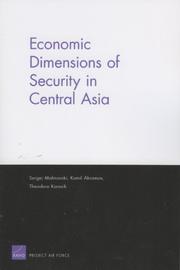| Listing 1 - 3 of 3 |
Sort by
|
Book
ISBN: 1283899426 0812207734 0812244656 Year: 2012 Publisher: Philadelphia : University of Pennsylvania Press,
Abstract | Keywords | Export | Availability | Bookmark
 Loading...
Loading...Choose an application
- Reference Manager
- EndNote
- RefWorks (Direct export to RefWorks)
How important is foreign aid in fostering economic growth in developing countries? Does it help recipient countries, hurt them, or have little effect either way? Foreign Aid Allocation, Governance, and Economic Growth investigates this issue by looking at foreign aid by sector rather than treating it as an aggregate amount. Aid can be allocated to a recipient's production sectors (such as agriculture, manufacturing, or mining), economic infrastructure (such as transport, storage, or communications networks or power generation facilities), or social sectors (such as education or healthcare). This book differentiates among various channels through which each of these three categories of foreign aid affects economic growth.The findings suggest that economic aid, including aid to production sectors and economic infrastructure, contributes to economic growth by increasing domestic investment. Aid to social sectors, however, does not appear to have a significant impact on human capital (measured by school enrollment) and economic growth. This study also assesses the degree to which the quality of democratic governance in a recipient country influences foreign aid's effectiveness and finds that democracy is no guarantee of aid effectiveness. In fact, economic aid to less democratic countries can lead to better economic growth, at least initially, provided the aid recipients secure property rights and allow capital accumulation. Although further research into the question is necessary, Foreign Aid Allocation, Governance, and Economic Growth suggests that aid targeted to increasing domestic investment might be an effective means of fostering economic growth in less developed countries.
Economic assistance --- Economic development --- Economic indicators --- Evaluation. --- Social aspects --- Developing countries --- Economic conditions. --- Business. --- Economics. --- Political Science. --- Public Policy.

ISBN: 0833037625 9786612282973 1282282972 0833040782 Year: 2005 Publisher: Santa Monica, CA : RAND Corporation,
Abstract | Keywords | Export | Availability | Bookmark
 Loading...
Loading...Choose an application
- Reference Manager
- EndNote
- RefWorks (Direct export to RefWorks)
Analyzes the economic, political, and security issues associated with Korean unification and considers what the capital costs of unification would be under differing circumstances and assumptions.
Korea (North) -- Economic policy. --- Korea (North) -- Politics and government. --- Korean reunification question (1945- ). --- Korean reunification question (1945- ) --- Security, International. --- Korea (North) --- Economic policy. --- Politics and government. --- Collective security --- International security --- International relations --- Disarmament --- International organization --- Peace --- Korean unification question (1945- ) --- Reunification of Korea (1945- ) --- Unification of Korea (1945- )

ISBN: 0833038664 9786611180850 1281180858 0833042424 9780833042422 9781281180858 9780833038661 Year: 2007 Publisher: Santa Monica, CA : RAND Project Air Force,
Abstract | Keywords | Export | Availability | Bookmark
 Loading...
Loading...Choose an application
- Reference Manager
- EndNote
- RefWorks (Direct export to RefWorks)
This report assesses the economic dimensions of security in post-Soviet Central Asia and considers their implications for the role of the United States. The September 11, 2001, attacks on the United States led to the realization among policymakers that instability, failed and failing states, and economic and political underdevelopment present security concerns not just to the states that suffer directly from these problems but to the global community as a whole. In this regard, Central Asia may be at a crossroads, as demonstrated by the so-called "Tulip Revolution" in Kyrgyzstan and the unrest
Economic assistance, American. --- Economic assistance, American --- Business & Economics --- Economic History --- Asia, Central --- Economic conditions --- Social conditions --- American economic assistance --- Mutual security program, 1951 --- -Asia, Central
| Listing 1 - 3 of 3 |
Sort by
|

 Search
Search Feedback
Feedback About UniCat
About UniCat  Help
Help News
News